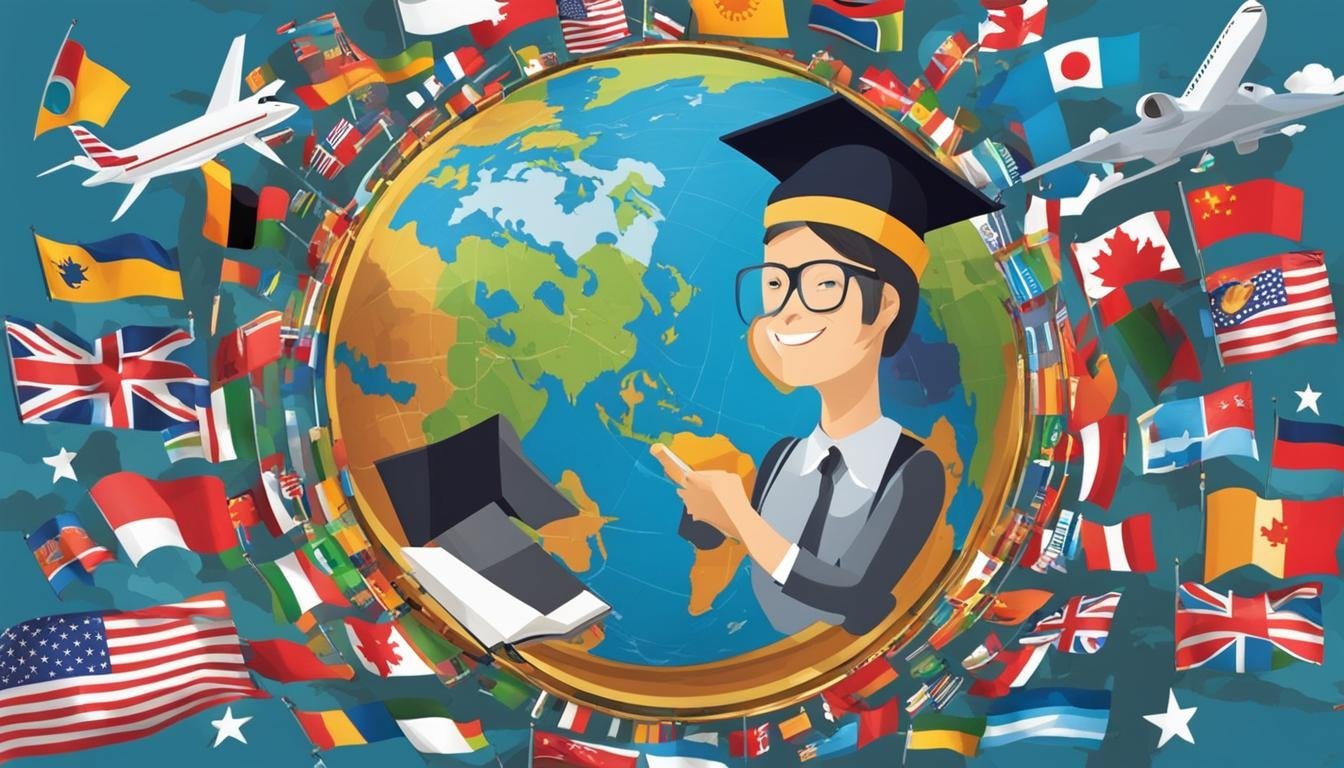Are you a college student looking for an unforgettable experience? Consider studying abroad! Not only does it offer a guide for your academic journey, but it also provides a myriad of benefits that can enhance your academic success, allow you to explore new cultures, and increase your career prospects.
Key Takeaways:
- Studying abroad offers numerous benefits for college students and graduates.
- It provides opportunities to explore new cultures and experience different perspectives.
- Enhances academic experience by exposing students to different styles of education and language immersion.
- Boosts career prospects by showcasing international experience, adaptability, and problem-solving skills.
- Facilitates personal growth and lifelong connections through independence and networking.
Explore the World and New Cultures
Studying abroad offers students the incredible opportunity to explore new cultures and immerse themselves in a different country. It’s more than just attending classes; it’s about experiencing the richness and diversity of a foreign land. By participating in study abroad programs, students can embark on a journey of self-discovery, adventure, and cultural enlightenment.
International travel becomes a gateway to new terrains and a world of cultural perspectives. Students can travel to breathtaking landmarks, take in the stunning landscapes, and immerse themselves in the daily lives of locals. Interacting with people from different backgrounds and experiencing their customs and traditions provides a unique opportunity to gain a deeper understanding and appreciation of diverse cultures.
As an example of such an enriching experience, one student shared their study abroad journey: “Living in Spain allowed me to taste delicious tapas, witness vibrant flamenco performances, and explore the historic streets of Barcelona. It was an immersive experience that transformed my perception of the world and broadened my horizons.”
Enhance Academic Experience

Studying abroad presents an unparalleled opportunity for students to broaden their academic horizons and explore different styles of education. By immersing themselves in a new cultural and educational environment, students can gain a unique perspective and expand their academic interests. They have the chance to enroll in courses that may not be available at their home institution, allowing them to delve deeper into subjects they are passionate about or venture into new academic territories.
Language skills are another key aspect of enhancing the academic experience while studying abroad. Immersion in a foreign country provides an immersive language learning environment, allowing students to develop language proficiency at an accelerated pace. By interacting with locals and practicing the language on a daily basis, students can sharpen their language skills and become more fluent, which can be a valuable asset in their future academic and professional endeavors.
Major Exploration and Academic Courses
Studying abroad also offers students the opportunity to explore different majors and academic courses. They can explore new areas of interest or gain a deeper understanding of their chosen field by enrolling in specialized courses offered in their host country. This exposure to a diverse range of academic options can spark new passions and insights, helping students shape their academic and career path.
Studying abroad allows me to experience a completely different style of education. The interactive and hands-on approach in my host country has greatly enriched my learning experience and broadened my perspective. I have also been able to take courses that are not offered at my home institution, which has allowed me to delve deeper into my major and explore new academic interests.
The combination of different styles of education, major exploration, language skills, and diverse academic courses makes studying abroad a transformative experience that enhances a student’s academic journey. It provides them with a well-rounded education and equips them with the knowledge and skills necessary to excel in a globalized world.
Boost Career Prospects

When it comes to future employers, studying abroad can greatly enhance your career prospects. Employers value candidates with international experience, recognizing the global mindset and adaptability that comes with living and studying in a foreign country. Your time abroad demonstrates to potential employers that you have the ability to navigate unfamiliar environments and thrive in diverse settings.
One of the key advantages of studying abroad is the opportunity to develop language skills. Being fluent in another language is highly valued in today’s globalized workforce, as it opens doors to international job opportunities and provides a competitive edge. Employers are increasingly seeking candidates with multilingual abilities, as it showcases your ability to communicate effectively and bridge cultural gaps.
Studying abroad not only gives you a global perspective but also hones your problem-solving skills. Adapting to a new culture, language, and academic system requires you to think critically and find innovative solutions. These problem-solving abilities are transferable skills that future employers highly value.”
Furthermore, studying abroad fosters adaptability and resilience, which are essential skills in today’s rapidly changing job market. Employers are seeking individuals who can quickly adapt to new situations and navigate through uncertainty. Studying abroad equips you with the ability to think on your feet, manage unexpected challenges, and embrace change.
Developing a Global Network
In addition to boosting your career prospects, studying abroad also allows you to build a diverse network. The connections you form with fellow international students, locals, and professionals in your host country can be invaluable throughout your career. Creating these personal and professional relationships can lead to new opportunities, collaborations, and a broader understanding of different industries and markets.
- Expand your professional network through internships and industry events.
- Develop lasting friendships with people from around the world.
- Tap into the knowledge and expertise of professionals in your field.
Overall, studying abroad offers you the chance to gain international experience, develop language skills, showcase adaptability, and strengthen problem-solving abilities. These qualities are highly sought after by employers and can give you a competitive edge in the job market. Additionally, the connections you make and the global network you build during your time abroad can open doors to new career opportunities and provide a rich source of inspiration and support throughout your professional journey.
Personal Growth and Lifelong Connections

Studying abroad is not just about academics and career prospects; it is also a transformative experience that fosters personal growth. Immersing oneself in a new culture and navigating unfamiliar territories promotes independence and self-discovery. Students are challenged to step out of their comfort zones, adapt to new environments, and overcome obstacles on their own. This process not only builds resilience but also develops problem-solving skills that can be applied in all aspects of life.
Living in a foreign country also provides the opportunity to form lifelong friendships with people from different backgrounds. These friendships transcend geographical boundaries and can last a lifetime. By connecting with individuals from diverse cultures, students gain a broader perspective and a deep appreciation for the richness of human experiences. The shared memories, experiences, and support from these lifelong friends become an invaluable part of their personal journey.
The Importance of Networking
In addition to personal development, studying abroad offers ample opportunities for networking. Engaging with classmates, professors, and professionals in the host country allows students to expand their network and build connections across borders. These connections can be valuable for future career opportunities, internships, and collaborations. Building a diverse network during their time abroad ensures that students have a global support system and a wider range of resources to draw upon as they navigate their professional paths.
Studying abroad is not just an academic experience, but a transformative journey of personal growth and lifelong connections. It is a chance to become more independent, develop problem-solving skills, and expand one’s perspective through cultural immersion. The friendships formed during this time become a source of support, inspiration, and a testament to the incredible capacity for human connection.
Conclusion
Studying abroad offers a plethora of benefits for college students and graduates. The experience not only enriches their academic journey but also broadens their cultural awareness, paving the way for personal growth and increased career prospects.
By studying abroad, students enhance their academic success by immersing themselves in different styles of education and exploring new academic interests. They have the opportunity to take courses not available in their home country, gaining a deeper understanding of their field of study and acquiring language skills through real-life immersion.
Furthermore, studying abroad opens doors to exciting career prospects. Employers highly value international experience, adaptability, and problem-solving skills – all of which students develop while living and studying in a foreign country. The ability to navigate diverse environments and cultures sets them apart from their peers, making them attractive candidates in the global job market.
Lastly, studying abroad promotes personal growth and the formation of lifelong connections. It pushes students out of their comfort zones, fostering independence and resilience. The experience allows them to forge meaningful friendships with people from different backgrounds, building a diverse network of connections that can prove invaluable in their future endeavors.
FAQ
What are the benefits of studying abroad for college students and graduates?
Studying abroad offers opportunities to immerse oneself in a foreign culture, enhance academic experience, expand cultural awareness, develop language skills, open doors to career opportunities, and foster personal growth.
How does studying abroad allow students to explore new cultures and experiences?
By immersing themselves in a different country, students can travel, see new terrains, visit landmarks, interact with locals, experience customs and traditions, and gain a deeper understanding and appreciation for different cultures.
How does studying abroad expand academic experience?
Studying abroad allows students to enroll in courses that may not be available at their home institution, gain language proficiency through immersion, and experience different styles of education, adding depth to their education and helping them stand out among their peers.
How does studying abroad provide a competitive edge in the job market?
Employers value candidates with international experience, language skills, and the ability to adapt to different environments. Studying abroad demonstrates independence, problem-solving skills, and cultural competence, which are highly sought after in a globalized world.
How does studying abroad foster personal growth and lifelong connections?
Living in a foreign country challenges students to adapt to new situations, develop problem-solving skills, and become more independent. Additionally, studying abroad allows students to form lifelong friendships with people from different backgrounds, creating a diverse network of connections.
Source Links
- https://seaver.pepperdine.edu/blog/posts/benefits-of-studying-abroad.htm
- https://www.internationalstudent.com/study-abroad/guide/ten-benefits-to-studying-abroad/
- https://www.usnews.com/education/articles/how-study-abroad-can-benefit-college-students


